
Mesa Community College REA 281
Principles of Real Estate Law study materials
Disclosure in Real Estate
Subjects Covered
The Many Facets of Disclosure in Real Estate
A complete list of areas where disclosure comes into play.
Examples of filled out SPDS forms
Several examples of real SPDS forms - find out what the sellers did right and wrong in filling out their SPDS.
Blank SPDS form (handout)
Print out an SPDS form and practice filling it in. It is good to know the contracts so you can answer questions for your clients.
Stigmatized Property Laws and Issues Sellers Do Not Have to Disclose
While there are many issues of disclosure, there are also areas where the agent must learn to keep things confidential to follow the wishes of a client.
Consequences for Ignoring Disclosure Issues
Breaking disclosure rules may result in serious consequences. Learn why honesty is important in all real estate dealings.
The Many Facets of Disclosure in Real Estate
Material Facts
Seller (the principle) and seller's broker must disclose anything known that would affect the "tender condition" of the property. This includes condition of the land or improvements, whether it is in a flood zone, other geological zone, Superfund zone, airport noise, noisy neighbors, chemical contamination, meth lab [if not already remediated], mold, swimming pool laws, lead paint, asbestos, radon gas, pesticides (near farmland), formaldehyde (in UFFI foam insulation), underground storage tanks, leaks, moisture, visible water stains. Past repairs. Agent may be liable if red flags exist. Agent should not play the role of an inspector, but should advise client to hire an inspector when buying property.
Contractual Disclosure Forms
The purchase contract is basically one long disclosure form in and of itself. Brokers may require many additional disclosure forms to complete a transaction.
The Lead Based Paint Disclosure must be included if the home was built before 1978, and must be signed by all parties on the same sheet of paper. Within five days of contract acceptance, the buyer must receive the booklet, Protect Your Family From Lead In Your Home, issued by the U.S. Environmental Protection Agency, U.S. Consumer Product Safety Commission, and U.S. Department of Housing and Urban Development.
Other AAR and ARMLS forms: "As Is" Addendum (if sold in "as is" condition); Seller Property Disclosure Statement (SPDS) to be filled out by the buyer (not the agent); Short Sale Addendum (if a short sale); Real Estate Agency Disclosure and Election; Buyer-Broker Exclusive Employment Agreement; Exclusive Right to Sell; Buyer's Inspection Notice and Seller's Response (BINSR), Consent to Limited Dual Representation (if dual agency exists); Disclosure of Buyer Agency and Seller Waiver and Confirmation; Domestic Well Water Addendum or Well Use Addendum (if water comes from a well); On-Site Wastewater Treatment Facility Addendum (if one exists); HOA Condominium/Planned Community Addendum (if property is in an HOA); Buyer Advisory (initialed and signed by buyer - get latest version from AARonline.com, not on Zipform); Appraisal Contingency Notice; Market Conditions Advisory (buyer acknowledges markets are cyclical).
Other forms brokers may require: buyer walk through (buyer and agent sign after final walk through before closing); estimated settlement cost (listing agent discloses to client how much they will receive - or owe - at close of escrow); CC&R receipt (buyer acknowledges receipt of HOA documents); Residential Pool Safety notice (buyer signs a form stating that they understand the swimming pool laws and that they received a copy of the laws). Many brokers require pool disclosure forms even if no pool currently exists; disclosure and release regarding mold (buyer acknowledges that they understand they have the right to inspect for mold); service pledge; list of home inspectors (buyers initial or sign to acknowledge that agent gave them a list of recommended inspectors).
Insurance History
Purchase contract requires a statement of past insurance claims, usually in the form of a CLUE (Comprehensive Loss Underwriting Exchange) report.
Title History
The title/escrow agency runs a title history search to turn up any undisclosed or unknown information about the chain of ownership of the property. Anything the title search finds must be disclosed to all parties, such as:
Previously undisclosed spouses who may have a claim.
Encroachments.
Deed restrictions.
Lis pendens, liens, or any other encumbrance.
Geological facts, such as flood zone, etc.
Easements, property line disputes.
An easement by prescription lawsuit may force a property owner to allow an easement for use of their land. The plaintiffs must show: (1) TIME people must be using the easement for ten or more continuous years for the same purpose. After ten years they are no longer trespassers. The owner can avoid this by reporting trespassers to the police, building a fence, posting a sign, etc. (2) OPEN The trespass must be out in the open, easy to see. (3) HOSTILE They must use the path without permission of the owner (if they have permission, the owner can revoke it). (4) NOTORIOUS the trespass must be well known to others.
Squatters (or neighbors in the case of a property line dispute) may take title to a property they occupy in a prescription suit for adverse possession. To do so, the plaintiff must prove the same four things needed for an easement by prescription: their use of the land was open (easy to see), hostile (without permission), notorious (well known by others), and lasted for ten years (continuous tacking - claims by different individuals may add together).
An agent should be alert to any red flags that may exist, since agents may be held responsible for red flags if trouble later develops.
HOA Disclosure
HOA documents must be provided to buyer within ten days of contract acceptance. Less than fifty units, seller (owner) supplies CC&Rs; more than fifty units, management company or HOA board provides CC&Rs.
Buyer may ask for and receive disclosure of monthly dues, cash in reserves, condition of property, trouble between owners or board members, lawsuits, pending lawsuits, budget, pending near-term assessments, CC&Rs, by-laws, percentage of renter vs. owner occupied units (if known, or lender can find out), declarations by the board that change the interpretation of the CC&Rs.
Lending Disclosures
Reg Z - Residential lender must disclose the finance charges, terms of the loan, and the APR (annual percentage rates). If an ad mentions interest rate or specific payment information, it must also include a full disclosure in the fine print that states and explains the APR.
RESPA - Real Estate Settlement and Procedures Act (RESPA) applies when financing is federally related, i.e. VA or FHA. Lender must give borrowers the HUD booklet "Settlement Costs and You" within 72 hours, along with a good faith estimate of all closing costs within 72 hours of loan application. And other provisions.
In house lender - parties must sign an affiliated business arrangement disclosure notice if the real estate broker and lender have a financial relationship.
Amount of commissions and who is being paid must be disclosed.
Public report - disclosure document for subdivided or non-subdivided land.
Affidavit of Disclosure - disclosure document for five or fewer parcels in an unincorporated area of a county, or any land outside of a subdivision.
Statute of Frauds - verbal agreements between the parties are valid, but not enforceable. All real estate contracts (except a lease that can be performed within a year) must be in writing to be enforceable.
Agency disclosure. Agent must disclose who they represent. If dual agency exists, this must be disclosed and explained; special forms must be signed. Dual agency not advised.
Licensee must disclose to the public that they hold a real estate license when they buy or sell their own property, or when they represent a close associate or relative. A rider must appear on the "for sale" sign that says "owner/agent."
Fiduciary Duties of the Parties
Broker and broker's agents must be loyal to the principal, or client. The agent owes loyalty, obedience, disclosure, confidentiality, and accounting (per clause Ia and IIa of the Agency Disclosure and Election contract). The agent owes all parties reasonable skill and care, honesty, truthfulness, and disclosure of material facts (per lines 23-24 of the agency disclosure contract).
No undisclosed or secret profit from the deal.
Agent must explain contracts to the client and encourage the client to read the contracts and ask if they have any questions.
Agent must show all offers to the seller unless there is a contract and the seller instructs the agent not to present anymore offers (best to get this in writing).
Principal's (seller's) duties to agent - The client must disclose truthful information. The client must indemnify agent as agreed in the contract, which means the client holds broker harmless from liability for disclosing defects to a buyer. The client must bargain in good faith. This means the seller must be willing to sell the house. Buyers must also bargain in good faith, meaning that they intend to buy a house, not just waste the agent's time. The seller promises to pay the agreed commission.
Agent's (broker's) duties to third parties (anybody involved in the deal, or members of the public not under contract with the agent/broker). The agent owes truthful information, no false promises, full disclosure of material facts, material representation must be accurate, truthful, and factual.
The agent should avoid "puffing," which is an exaggeration or opinion. There is no law against it, but it is not always ethical and may serve to distract the public from material defects.
Principal's (usually seller's) duties to third parties (usually buyers). The seller owes fairness, honesty, and truthfulness. Seller's Property Disclosure Statement (SPDS) is a form the seller fills out to disclose defects to the buyer. The SPDS form is not required, but there should be a disclosure of some sort.
STUDENTS: Please tell the instructor if you notice any additional disclosure issues that should be on this list!
Example One:
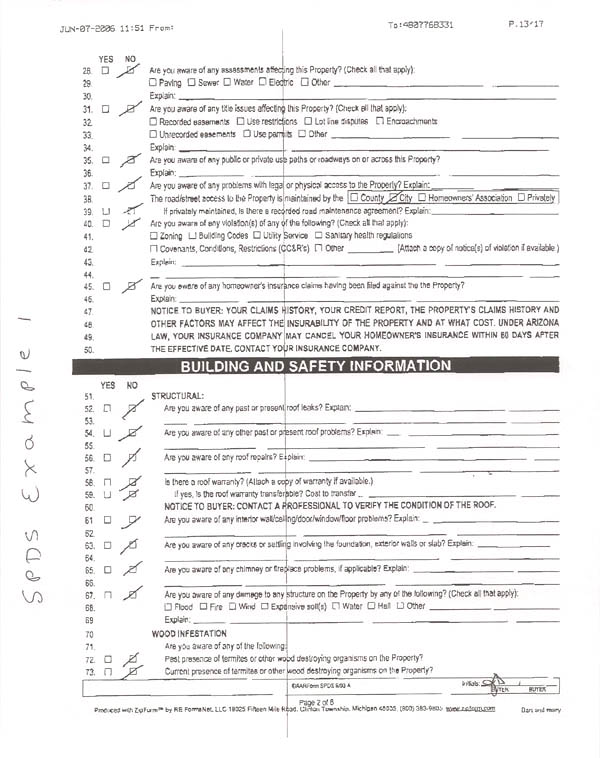
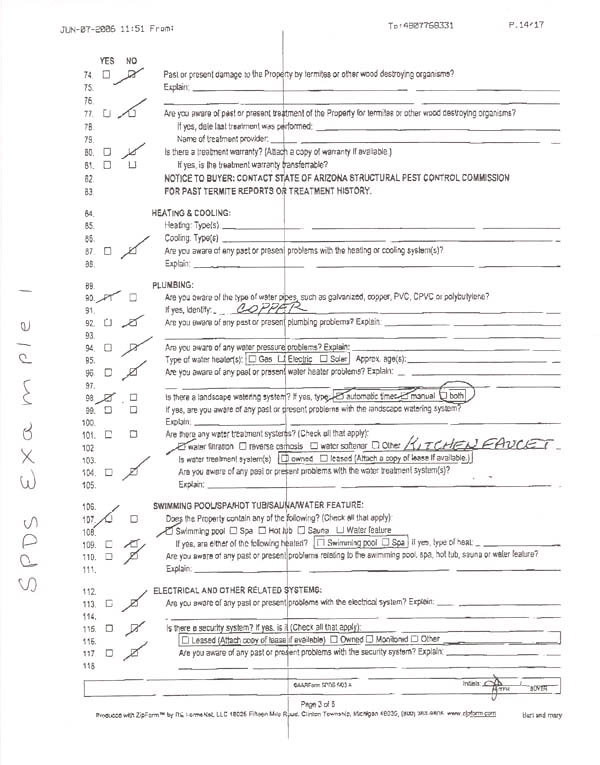
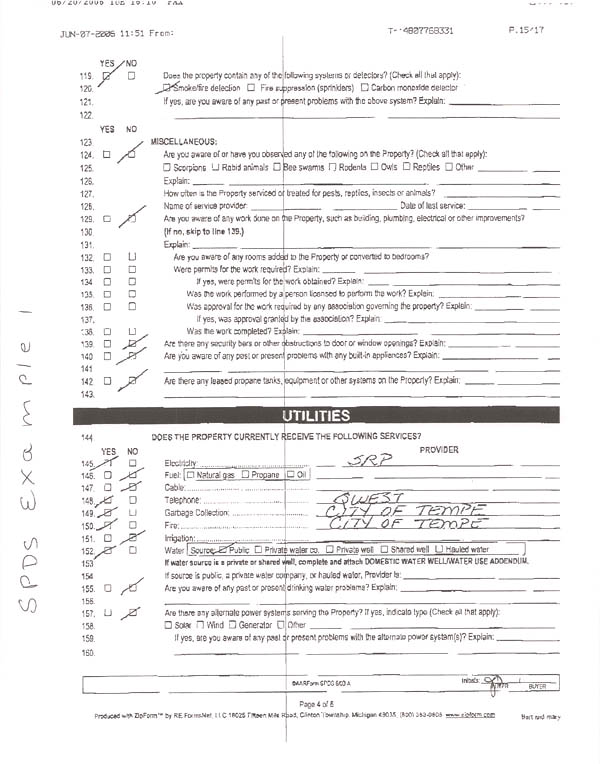
What should an agent do if they get an SPDS that does not disclose anything, such as the one above?
Example Two:
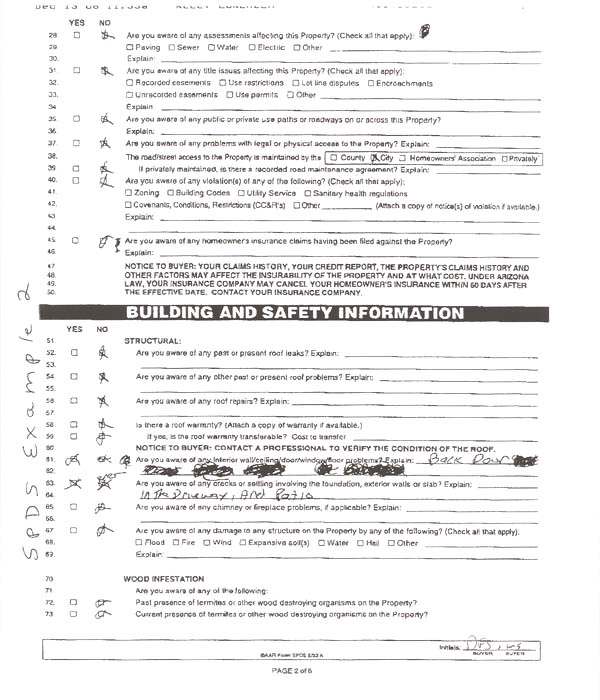
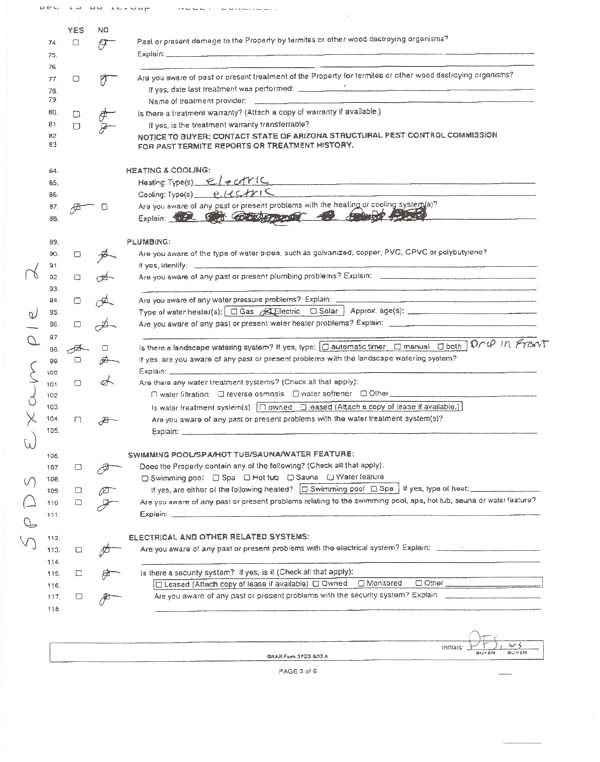
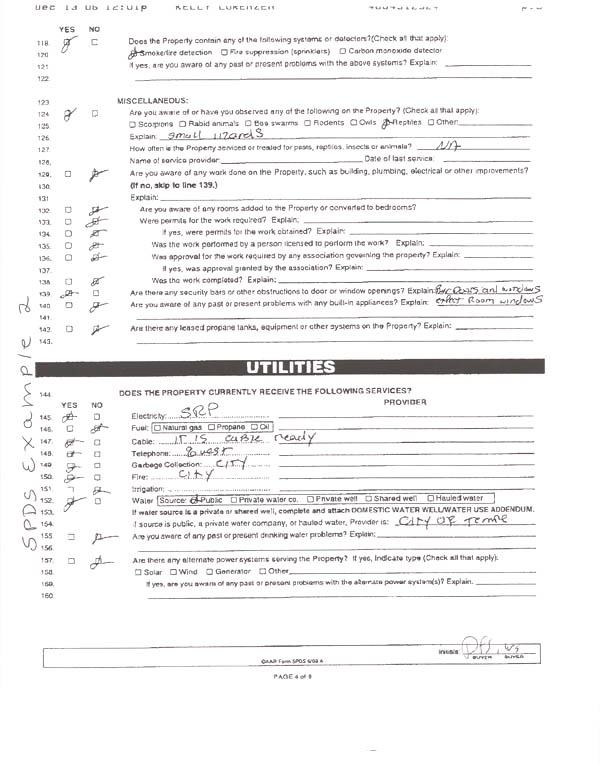
What should an agent do if they get an SPDS with things crossed out?
Click here for a blank SPDS form - during the second hour of the class, students will practice filling out the SPDS form.
Stigmatized Property Laws and Issues Sellers Do Not Have to Disclose
Agents owe confidentiality to their clients. They must disclose material facts, but cannot disclose anything personal without the client's written permission.
Examples of what not to disclose: the seller's personal situation, including marriage status, financial situation, bottom line on offers they will accept, reason for selling, etc.
In 1995, the Arizona Legislature enacted A.R.S. §32-2156, Arizona's first stigmatized property law. This law provides that sellers, landlords and real estate licensees have no duty to disclose to buyers or tenants that (1) a person has died on the property (whether by natural death, suicide, or homicide); (2) a felony has been committed on the property; (3) the property is or has been owned or occupied by a person who has AIDS or is HIV-positive, or has "any other disease that is not known to be transmitted through common occupancy of real estate"; and (4) the property is located in the vicinity of a sex offender (added in 1997). Lines 25-28 of the Agency Disclosure and Election contract spell this out in similar language.
If the seller wants the agent to disclose personal information or stigmatized property issues, the agent is smart to get permission in writing.
If the agent does not have permission and a third party asks questions about one of these issues, the agent may say: "Under Arizona law, I do not have to disclose that, but if it concerns you, here is where you may look up the information." Refer the party to the Buyer Advisory and other relevant resources.
The statute does not prohibit a seller or broker from disclosing such facts, rather the statute provides that if such facts are not disclosed by a seller or a broker, then no criminal, civil or administrative action may be brought against such person. The statute protects those persons from "failing to disclose" such facts, and apparently the statute does not necessarily protect a seller or real estate broker from making an affirmative misrepresentation concerning crimes or deaths on the property. It does not release the seller from disclosing other material facts.
Consequences for Ignoring Disclosure Issues
No Commission: Contract must be complete, including all required disclosure forms, to receive commission.
Lawsuit: A licensee who ignores disclosure rules risks a lawsuit, or having to pay monetary damages to a client or third party.
Fines: A licensee who ignores disclosure rules risks being fined.
Loss of License: A licensee who ignores disclosure rules risks suspension or loss of license.
Jail: Certain breaches of disclosure laws could result in jail time.
Disciplinary Action: A licensee risks disciplinary action from the broker, the Association of Realtors, the Arizona Department of Real Estate, the Real Estate Commissioner, the State of Arizona (or another state), or the United States of America. Especially try to avoid breaking a federal law, because federal laws may impose the most severe consequences :-)
Death Penalty: You cannot get the death penalty for breaking disclosure laws :-)
Besides real estate licensees, other parties may suffer consequences for ignoring disclosure rules: mortgage brokers, title agents, inspectors, appraisers, contractors, clients, third parties, vendors, and others.
Fraud is intentional misrepresentation (or omission) of facts that may cause harm if relied upon.
Unintentional misrepresentation is omission by mistake. If there are latent (hidden) defects, parties to a transaction may be held liable if there were red flags that should have alerted them to a problem.